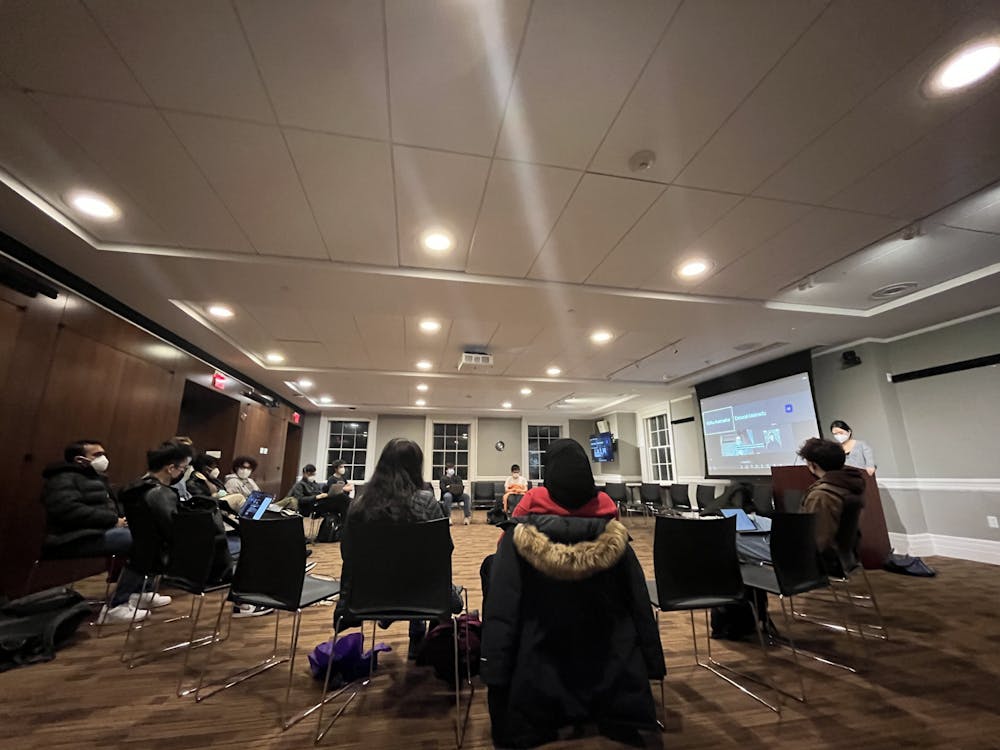The Undergraduate Council of Students continued its debate from last week about the spring 2022 elections timeline at its general body meeting Wednesday evening.
Ricky Zhong ’23, current UCS Student Activities Committee chair, updated the UCS general body on the Student Government Association’s meeting last Friday, which discussed the new election procedures and timeline this spring. The SGA meeting was open to all members of the Council.
There were two main topics of debate at the meeting: removing the write-in candidate policy and making student group endorsements anonymous, Zhong said. In previous student government elections, student groups were able to endorse the candidates in a public list released by the Council before elections occured.
According to Zhong, if no candidate is running for a position, then a write-in candidate needs at least 10% of votes from the voting body to win the election. Typically, one third of the whole student body participates in the voting process and 10% of them come down to about 230 students, he added. The Council debated on whether they should change the 10% threshold if they were to keep the policy.
“If there is (not) a specific need,” Zhong said, then “it sounds like the SGA generally is pretty open to (no longer having) write-in candidates.”
The majority of UCS general body members supported keeping the write-in candidate policy as well as its 10% voting threshold.
“It’s almost like freedom of speech and protest,” UCS General Body Member Christopher Vanderpool ’24 said. According to Vanderpool, the write-in ballot represents students’ voices in the elections.
Concerning the Council’s debate last week on the efficacy of club endorsements of candidates, Zhong mentioned that there might have been misunderstandings on the SGA’s resolutions.
“There was never a plan to completely remove endorsements … clubs still need to go to … the open forum in order to be able to endorse candidates by filling out a form … the only thing that's worth thinking about is whether to make endorsements anonymous,” Zhong said.
Members of the general body voiced disapproval against such anonymity.
“(Endorsements) are not important … if you don't have an understanding of who's endorsing and why,” UCS general body member Deborah Meirowitz ’22 said. Endorsements are a good way for the student body to learn what the candidates stand for, since student organizations only endorse candidates who share their mission, she added.
Community Engagement Chair Ayana Boyd ’24 thinks that the Council is making the assumption that “most students are coming into the electoral process inherently misinformed.” Even if they are, Boyd said, “(UCS) can mitigate that in other ways, rather than taking away the power from student groups who are representing large communities of color and social action groups.”
Other election issues discussed during the meeting include increasing time for campaigning and making sure the election's outline is clear for candidates.
According to UCS President Summer Dai ’22, no formal decisions are being made on the endorsement policy and the SGA is waiting to hear the opinions of their advisor Joie Steele, director of student activities.
Also at the meeting, UCS Treasurer Ritiika Avarrsekar ’23 updated the general body on its lump sum spending since the beginning of last semester.
Out of its $26,000 lump sum funding, UCS has spent around $15,000 on events like Staff Appreciation Day, Health and Wellness Week, the Fall Poll and the Arts with Impact Initiative, as well as student services like the Thanksgiving and Spring Break shuttle. Both shuttles cost between $3,000 to $4,000, and Staff Appreciation Day costs approximately $5,000.

Kathy Wang was the senior editor of community of The Brown Daily Herald's 134th Editorial Board. She previously covered student government and international student life as a University News editor. When she's not at The Herald, you can find her watching cooking videos or writing creative nonfiction.





